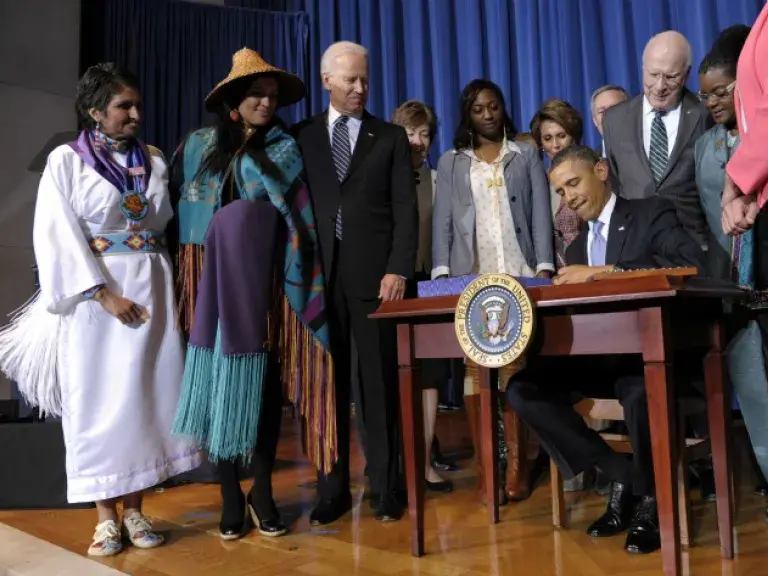

It was a watershed moment. Historic, because VAWA 2013 affords new and better protections to ALL victims of domestic violence, including the most vulnerable populations − Native women, immigrant women, and LGBT. Historic, because it restores tribal authority to protect Native women from certain violence in Indian country regardless of the race of the perpetrator.
To show just how life-saving the legislation’s tribal provisions are for Native women in Indian country, Diane Millich, a member of the Southern Ute Indian tribe, took center stage at the signing ceremony to share her story. Diane survived a year of domestic violence—more than 100 incidents of slaps, kicks, and punches—perpetrated by her non-Indian spouse on tribal lands, a man who quickly learned he was “untouchable” by tribal and state authorities for these horrific acts due to longstanding gaps in United States law.
Over three decades of grassroots, domestic, and international advocacy are helping close some of the jurisdictional loopholes in United States law that restrict protections for Native women just because they are Indian and are battered on an Indian reservation. These changes come none too soon. One in three Native women will be raped in her lifetime, and six in ten will be physically assaulted. The murder rate for Native women on some reservations is ten times the national average. All this when the federal and state officials with authority to prosecute these crimes are failing to do so at alarmingly high rates.
VAWA 2013 restores concurrent criminal jurisdiction to tribal governments over non-Indians having significant ties to the tribe and who commit domestic violence and dating violence against Native women in Indian country or violate protection orders. In general, tribes cannot start prosecuting non-Indian abusers until March 7, 2015. However, under a two-year pilot project, some approved tribes can begin doing so earlier. Regardless, tribes that choose to exercise the new tribal special domestic violence jurisdiction must meet stringent requirements concerning due process protections for defendants and court procedures, requirements similar to those needed to exercise enhanced tribal court sentencing authority under the Tribal Law and Order Act of 2010.
Join the Indian Law Resource Center and its Safe Women, Strong Nations project in celebrating VAWA 2013 as a historic step forward in ending the epidemic of violence against Native women in Indian country. Support our continuing work with Indian nations and Native women’s organizations to implement VAWA 2013 and the Tribal Law and Order Act of 2010 and to restore safety to Native women.
